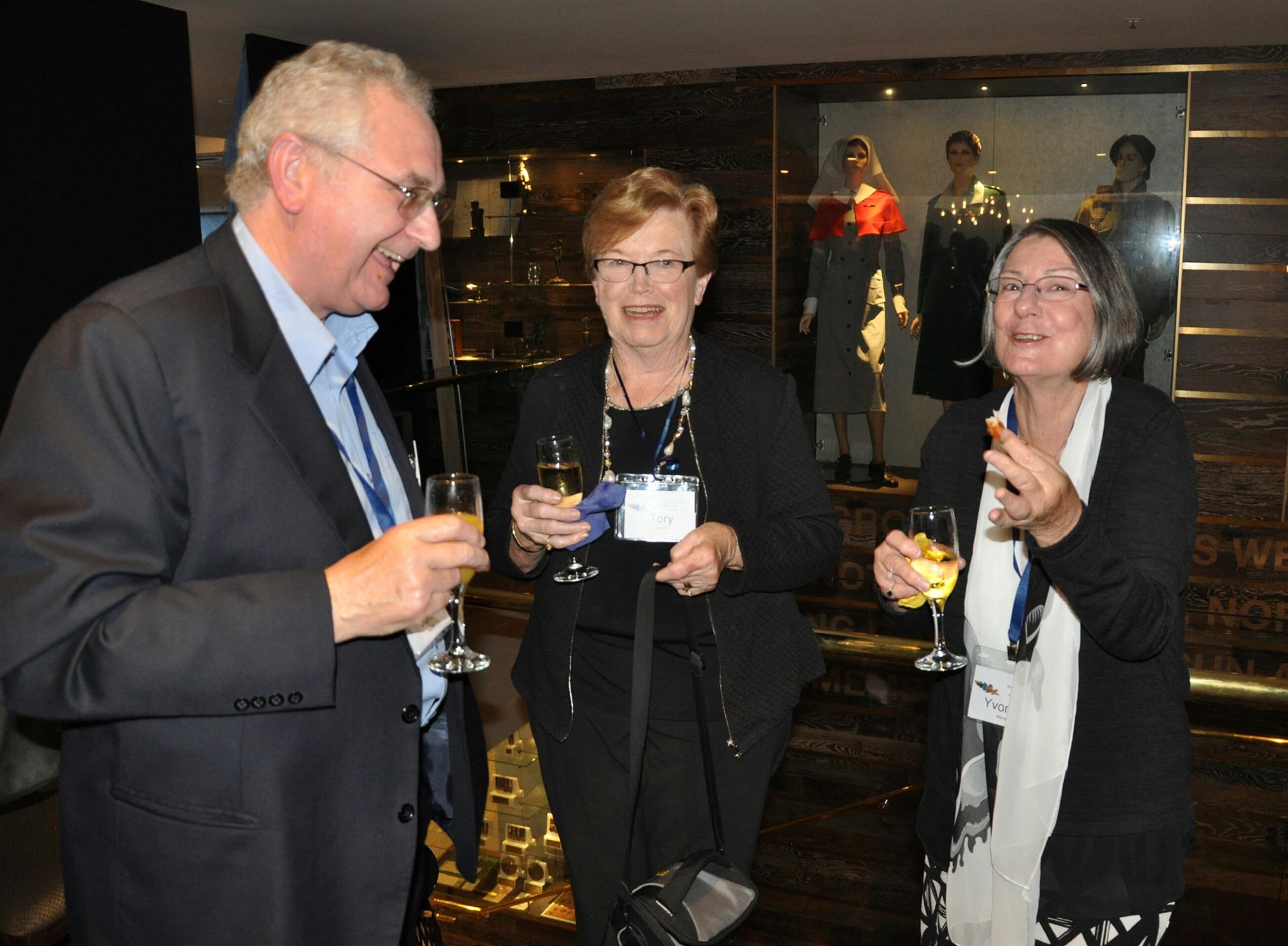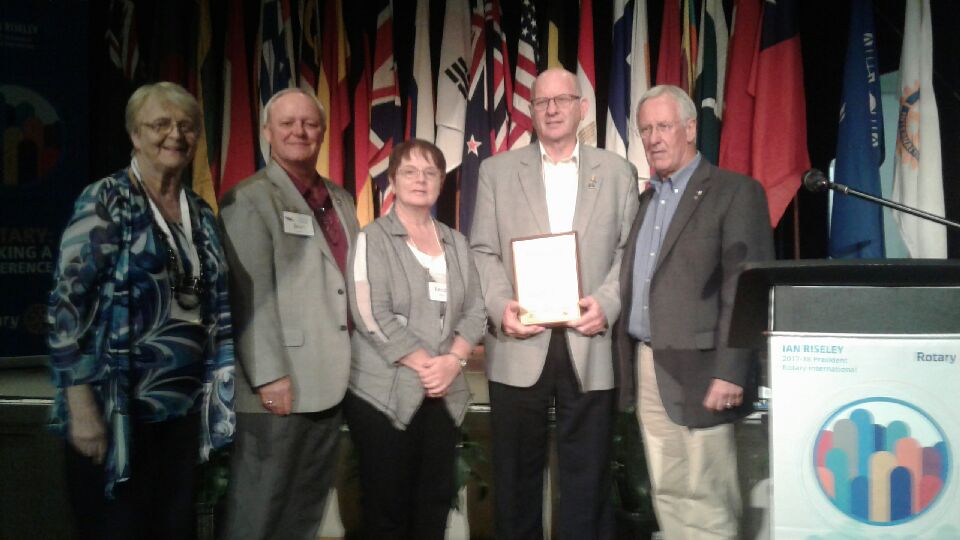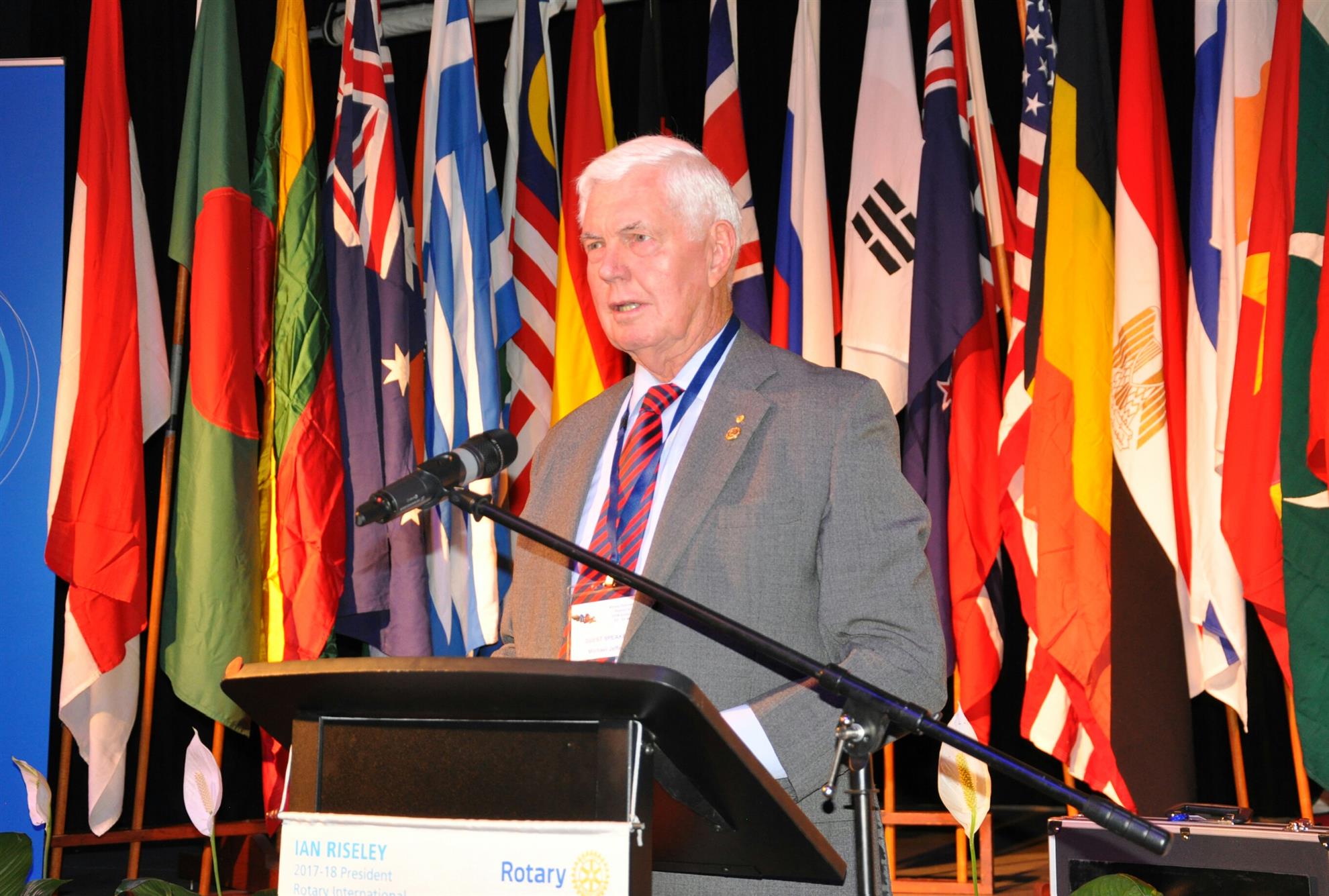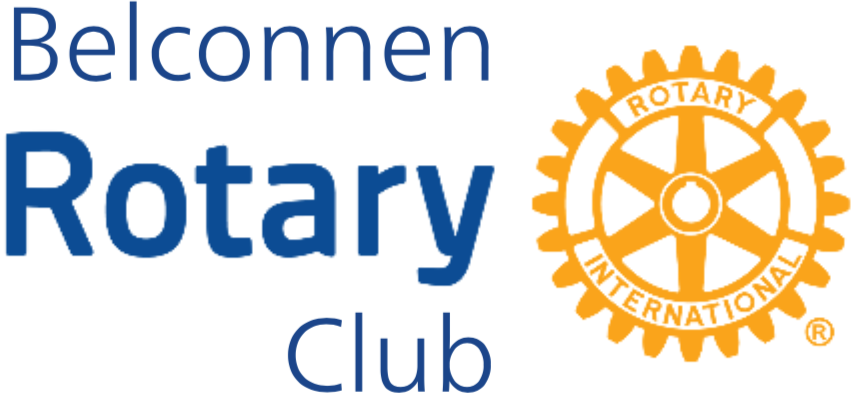
The District Conference held March 24th and 25th was awesome. The District Conference is where we go to learn about the tremendous impact that Rotary has on the lives of people in our communities both here and abroad.
Making a difference.
 Bryn Styles, the RI President's Personal Representative to our conference stated that it is important to attend the District Conference to understand the breadth of activities in which Rotary is engaged. Rotary is not RI - Rotary is us, Rotarian and Friends, and we're supported by Clubs, Districts, Zone, RI. But without us the Clubs, Districts, Zones and RI wouldn't exist. But we should remember to prioritise our commitment - Family comes first, then work, then Rotary. Don't overcommit as you'll lose everything.
Bryn Styles, the RI President's Personal Representative to our conference stated that it is important to attend the District Conference to understand the breadth of activities in which Rotary is engaged. Rotary is not RI - Rotary is us, Rotarian and Friends, and we're supported by Clubs, Districts, Zone, RI. But without us the Clubs, Districts, Zones and RI wouldn't exist. But we should remember to prioritise our commitment - Family comes first, then work, then Rotary. Don't overcommit as you'll lose everything.
Rotary's vision is "Together we see a world where people unite and take action to create lasting change - across the globe, in our communities, and in ourselves." Rotarians are People of Action! and we must be able, and prepared, to tell our personal stories in our local communities. Membership has to be flexible. Diversity - each club has to reflect the diversity of its local community . What is Belconnen's diversity profile and what is the diversity profile of our club?
Rotary Club Central and My Rotary are being updated to better support us as members. Our websites are important to tell our story in our local communities so we - make sure they are up-to-date. Our communities have to understand who we are so meaningful statistics in these tools are important. Please update your data in My Rotary so that the statistical picture is meaningful.
Noel Trevaskis, an RI Board member from our District, stressed that new members leave Rotary because in their early years they didn't learn about Rotary, didn't make friends, didn't do community service. He advised that our club has to focus on what we're doing in our community - international is less important. Fund raising is not the focus, only a means to an end. He urged us to publish "why did I become a Rotarian" stories - and tell them with passion and feeling. And we need to continue to change how we operate our clubs. He pointed out that in 15 years time 50% of Rotarians will come from India & SE Asia. In western countries Rotary is in serious trouble.
Australian Initiatives
Rotary Fitness
Rotary Fitness is a initiative from District 9710 supporting Australian Rotary Health, spearheaded by City2Surf Legend and Australian Rotary Health Ambassador, Chris Edwards of the Rotary Club of Hall. Have a look at the website rotary.fitness. Clubs are encouraged to organise Rotary Fitness events that could be just a regular fitness activity for our club members. As a PR exercise focussing on Health + Wellbeing it will give our local communities a completely different picture of Rotary and Rotarians.
“Rotary Fitness is as much about physical and mental health as it is about the health of Rotary and well-being of community.”
Rotary Fitness' aim is to support Rotary club and community fitness activities and in the process, raise funding for new medical research, scholarships, health education and awareness. Please join us and be one of the first to get involved. The worst that can happen is you’ll get fitter, make new friends and help to improve the lives of thousands as you exercise.
Australian Rotary Health
ARH is providing $300k pa of funding for research into the mental health of children. ARH concentrating on research to gain better knowledge of the causes of mental health in children and to propose strategies to deal with it.
Zone 8 Digital Communications solution.
Our Rotary story isn't getting though. Our Club website and FB page are where we have to tell our stories as these are where people look for information in this day and age. Paul Harris said in the 1930s that "this is a changing world; and we must be prepared to change with it."
The Zone 8 Digital Communications solution is a platform for consistent branding across autonomous club websites all connected to District. It will provide for a database capability, a membership management capability and an event management capability.
 Maj Gen Michael Jeffries noted that, on the 90th anniversary of the Rotary Club of Canberra, the new Rotarians of 1928 had to break down barriers of reserve from early Canberra residents about this initiative from the US. He highlighted some of the amazing achievements of Australian Rotary including the 1985 Polio Plus initiative and the Diamond Jubilee Trust of Australia project to eradicate blindness across the Commonwealth. The Australia Trachoma Alliance was joined by Rotary in the Nourish our Communities project. Visit the End Trachoma 2020 website and learn about how Rotary is building healthy communities. He urged us to get behind the Soils for Life program that is providing farmer-to-farmer mentoring on regenerative land management. It has financial, social, and scientific aspects. Improving soils requires carbon in the soil from green vegetation. Water, food and soil security is the next global train smash. There is a need to reconnect urban Australians to their rural communities in order to provide food and economic security. We could have Rotary projects to establish gardens in every primary and secondary school together with a mandated curriculum across Australia.
Maj Gen Michael Jeffries noted that, on the 90th anniversary of the Rotary Club of Canberra, the new Rotarians of 1928 had to break down barriers of reserve from early Canberra residents about this initiative from the US. He highlighted some of the amazing achievements of Australian Rotary including the 1985 Polio Plus initiative and the Diamond Jubilee Trust of Australia project to eradicate blindness across the Commonwealth. The Australia Trachoma Alliance was joined by Rotary in the Nourish our Communities project. Visit the End Trachoma 2020 website and learn about how Rotary is building healthy communities. He urged us to get behind the Soils for Life program that is providing farmer-to-farmer mentoring on regenerative land management. It has financial, social, and scientific aspects. Improving soils requires carbon in the soil from green vegetation. Water, food and soil security is the next global train smash. There is a need to reconnect urban Australians to their rural communities in order to provide food and economic security. We could have Rotary projects to establish gardens in every primary and secondary school together with a mandated curriculum across Australia.
What is Probus?
Probus was a community service profit of Rotary International. Probus is an association for retired and semi-retired people. Aim to keep minds active, expand interests, and build community through fun, fellowship, friendship. Probus began in England 1965, NZ in 1974, and Australia in 1976. The 1st Australian club was at Bateman's Bay in 1980. We were encouraged them for volunteers, to help advertise our youth projects, and invite them to join Rotary.
Rotary Youth Exchange. Monique went of RYE to Austria. She spoke about the immense value she got from being part of a new small family for a year, not just her host families but also the RYE family. Why go on exchange? To make her own world picture. In Australia you can drive for an hour and perhaps change postcode. In Europe you be in another country, if not two. She learned to be a responsible traveller and developed amazing friendships, especially with her host families.
4 Way Test speaking competition. Phoebe, a year 12 student from Bowral, won the Southland Highlands Four Way Test speaking competition competition this year and her topic was that "Politicians don't utilize an ethical framework to guide their decisions" as it is ethical principles that underpin decency. In particular she questioned whether holding Australia Day on the 26 January would stand up to the Four Way test. To summarise her points:
- Is it to truth ? No. We have only celebrated Australia Day on 26 January since 1988. Prior to 1988 26 January was NSW Proclamation Day. Our true national day is 1st January.
- Is it fair? No, not to our indigenous Australians as it is simply the date of colonisation, and then only of NSW.
- Does holding the event on the 26 January build goodwill and friendships. No, because it is a devisive date it has been used by some to generate hatred and division and foment conflict in our multi-racial society.
- Is it beneficial to all concerned? No. The date only appeals to a small segment of our society and ignores that fact that our true National day is 1 January, the date on which the Commonwealth of Australia came into existence.
Her conclusion was that the decision to hold Australia Day on the 26th January fails the Four Way test and as such should reconsidered.
PCYC Formerly known a Police Boys Club, PCYC is an 80 year old partnership between Rotary and the Police established in 1937 by Rotary and Commissioner William Mackay to counter gangs roaming Wooloomooloo. PCYC now has 110,000 members but only a small proportion are children at risk. The objective is to instil in kids from all backgrounds value of respect, commitment, resilience, integrity and citizenship. They operate across NSW and are very conscious of their relationship with Rotary. PCYC people are encouraged to join their local Rotary Club and Rotarians to become actively involved in there PCYC club.
International Initiatives
AIDS orphanage Kwazulu Natal. Libby Weir has been working in this very poor community for 15 years. There is 75% unemployment and it is an AIDS epicentre. There are 96 in the orphanage. There are many child-led families dependent mostly on the charity of their neighbours. On her first assignment she was to help establish a preschool in a neighbouring valley - in a commercial abattoir. Her work has developed to build housing, vegetable gardens, sewing clothes. This helps lift the people out of poverty. Local schools have class sizes 60-80!. She has helped build libraries in schools and provided the children with school shoes, She established a village soccer team to build community spirit. She has established woodworking and welding courses for men and women but receives no government support. School holiday programs and emergency food parcels help support the child headed households. Five months has turned into15 years simply because the job needed doing and she was there.
Papua New Guinea, refugees, and Limpopo South Africa. Sr Dane Inglis has had 50 years of contact with Rotary since joining Australian Volunteers Abroad 1968 - sponsored by Rotary. In 1972, now a nun, she returned returned to PNG and walked in a mission school supported by QLD rotarians. By 1987 she was in Europe working with refugees headed for Italy, and ran a soup kitchen in the basement of the Baroque church of Jesu. She monitored the war in Liberia and reported to government and other agencies on refugee issue. In Dakar she worked on program of Africans helping Africans. From 2001 to 2009 she was in South Africa working with an AIDS team in Limpopo . Rotary helped establish and refurbish an old school. In 2009 she moved to Senegal building an infants school in Burkina Faso with more help from Canberra Rotary. A truly remarkable women who now lives in a convent the Southern Highland she highlighted how Rotary helps people like her working on the front line of poverty and disease in some of the most disadvantaged places on earth.
Rotarians Against Malaria. Steve and Dorene Carroll gave a most entertaining address on how they became passionate about RAM. The story starts with Steven some old Army mates from the Vietnam War days deciding to do something about the huge numbers of land mines still scattered over Laos. Having trained locals to do the mine clearance they turned their attention to establishing schools and water and sanitation projects in local villages.
Malaria was a constant threat and kills 725,000 per year. To put that in perspective, the atom bombs dropped on Japan killed 80,000. In WW2 Japan lost 160,000 to malaria.There are 2,500 species of mosquito but Plasmodium Falaiparom is the killer parasite. Death occurs in 24 hrs if no antidote is given. P v........ is the more common parasite but doesn't kill, at least not a quickly. They helped develop the Healthy Villages Program that works on the removal of stagnant water and also provides anti malarial nets and test kits.
To put all this in perspective Steve and Dorene lost they 19 year old daughter to malaria after she contacted the disease in Malaysia. They are using this intently personal motivation to vigorously promote RAM and are great advocate for the project.
Tanzania. St Jude school. Seb Cox is a UC Rotaractor who got involved in this RAWCS project. St Judes was established in 2003 - and now has 1300 students. He was asked to go to Tanzania to help set up an Interact club in St Jude's. On subsequent trips he has established an Earlyact club in St Jude's primary school. Many D9710 clubs have supported the St Jude's project and the results are outstanding. Seb was also an outstanding example of Rotaract and Rotaractors.
Rotaractors from the Yass Rotaract Club reported on their Bali project. With no prior skills they built a house and a piggery for a family living in abject poverty in a village in the north of Bali. Included in their team were two RYE exchange students who couldn't believe their good fortune in being involved in such an endeavour. It is truly amazing what a group of teenagers can achieve.
Siera Leone - Aminata Conteh-Biger. This was perhaps the most touching, sad and motivational of all the keynote talks. Aminata has now been in Australia for 18 years but in January 1999 she was one of the many girls kidnapped by rebels from their school in Freetown and used as a sex slave for 7 months. She said that the child-soldier rebels were the scariest. Among other dreadful experiences she learned to hide under dead bodies to stay hidden. Her bible a great strength. Released in a truce she got help from the UNHCR and was accepted as a refugee to Australia. She thought she was going to Austria! She told the conference that being a refugee is hard - integration, language, culture all present huge challenges. She started volunteering with UNHCR and has started a foundation to build a maternity hospital and clinics in Sierra Leone. Sierra Leone needs lots of doctors and maternal health support. The Ebola epidemic was a setback as lots of ebola was spread through hospitals and people were scared to go for treatment. Fistula is a particular problem. Recommended viewing is the SBS doco "Daughter of Sierra Leone".

